Shakespeare: On the Power of the Mind
Tuesday, November 29, 2005 → by Danieru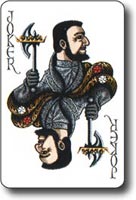 On Imagination:
On Imagination:Midsummer Night's Dream - Act v. Sc. 1.
The poet's eye, in a fine frenzy rolling,On Memory:
Doth glance from heaven to earth,
from earth to heaven,
And as imagination bodies forth
The forms of things unknown, the poet's pen
Turns them to shape, and gives to airy nothing
A local habitation and a name.
Macbeth - Act v. Sc. 3.
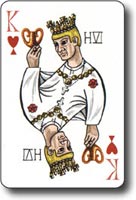
Canst thou not minister to a mind diseased;On Denial:
Pluck from the memory a rooted sorrow;
Raze out the written troubles of the brain;
And, with some sweet oblivious antidote,
Cleanse the stuffed bosom of that perilous stuff
Which weighs upon the heart?
Richard III - Act i. Sc. 3.
Oh, who can... cloy the hungry edge of appetite,Macbeth - Act i. Sc. 3.
By bare imagination of a feast?
Present fears
Are less than horrible imaginings.
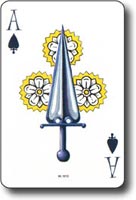 On Illusion:
On Illusion:Macbeth - Act ii. Sc. 1.
Is this a dagger which I see before me,
The handle toward my hand?
Come, let me clutch thee;
I have thee not, and yet I see thee still.
Art thou not, fatal vision, sensible
To feeling as to sight? or art thou but
A dagger of the mind, a false creation,
Proceeding from the heat-oppressed brain?
I see thee yet, in form as palpable
As this which now I draw.
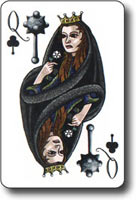 On The Self:
On The Self:The Tempest - Act iv. Sc. 1.
Our revels are now ended.Some quotes taken from V.S. Ramachandran's enthralling book 'Phantoms in the Brain'. Other's found at Project Gutenberg. (Incidentally, click the playing cards to see the whole Shakespearean deck...)
These our actors,
As I foretold you, were all spirits and
Are melted into air, into thin air..
We are such stuff
As dreams are made on,
And our little life
Is rounded with a sleep.
Categories: Quotes, Books, Shakespeare, Mind, Brain, History, Human, Science, Psychology, On the Nature of...
Labels: On the Nature of
|
|

 Links
Links Subscribe via RSS!
Subscribe via RSS!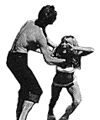


 Via Email
Via Email


November 30, 2005 7:39 AM
Prospero's spell, manipulated over the inhabitants of the island so effortlessly, has come to an end. each aspect was as if a dream he created; the island a theatre in which he cast his actors in their roles. Prospero's play within Shakespeares play has run its course
but what is the difference between this situation and the wider conflicts which life off the island/outside the play wields? control is beyond us mortal actors. this can be taken further to mean that Prospero, in a sense, was God.
life is a dream and we are just actors in that dream, one which we ourselves have no true control over. it is the illusion of control, and therefore the illusion of the self, which so resonates for me from this quote.
Shakespeare is all about your own representation though. a quote from a play is nothing until someone has absorbed it, and maybe Shakespeare was trying to say that the self is a mere representation too; that life, at base, will always be outside our means of control. we absorb what we want to absorb, there is no more meaning to a life than that
November 30, 2005 11:27 AM
The Prospero quote about "life is rounded with a sleep" eerily reminds me of Hamlet's "to die, to sleep, perchance to dream, aye there's the
rub, for in that sleep of death what dreams may come?" Where does reality stop and the dream begin? Is one person's reality the dream of another?
http://suchshakespearestuff.blogspot.com
December 01, 2005 2:54 AM
The mind is incredibly powerful - no one knew this more so than Shakespeare himself, adept as he was in twisting the human mind, the human self, the human life into so many wonderful variations
December 01, 2005 4:00 AM
Post a Comment